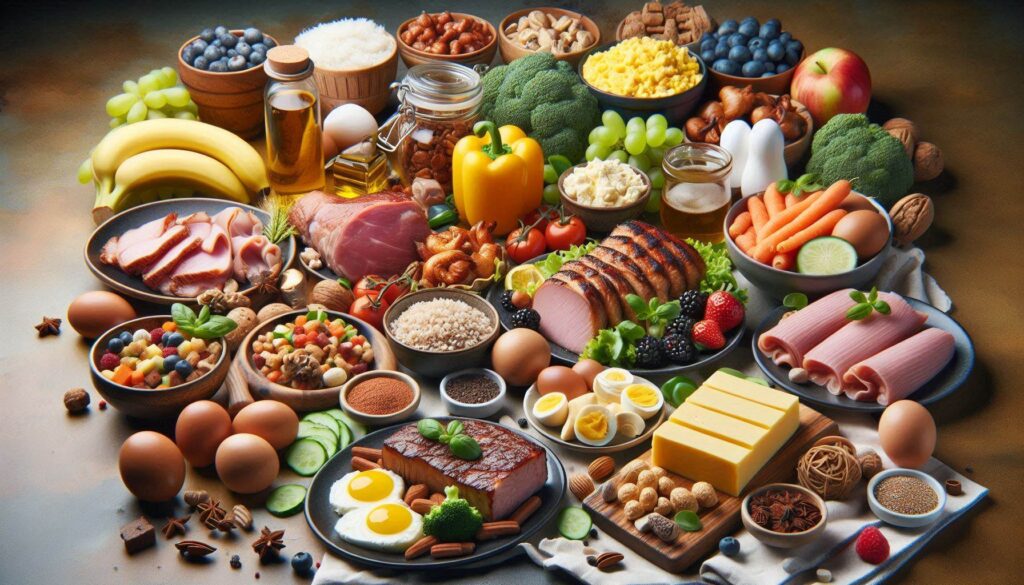Comprehensive Guide to the Comp Prep Diet: Mastering Your Natural Physique
Welcome to the Ultimate Guide on Nailing Your Comp Prep Diet
Introduction – The Comp Prep Diet
Ready to dominate the stage with a physique that screams natural bodybuilding excellence? This article will dive into the essentials of designing a comp prep diet guided by common natural bodybuilding techniques. We’ll cover the groundwork, the macros, and the adjustments you need to make to keep your gains while shredding fat, all while emulating the timeless physiques of legends using modern knowledge and practices.
The Starting Point
Before kicking off your comp prep diet, it’s crucial to have a solid foundation built from consistent training and nutrition. This foundation is essential as it ensures your body is primed for the intense journey ahead. Some athletes prefer to start cutting straight away, diving headfirst into their prep. Others, however, opt for a smoother transition at maintenance first, gradually adjusting their diet to avoid shocking their system.
Deciding between self-prep and hiring a coach is another pivotal choice. The merits of a coach lie in their ability to guide a beginner through the unknowns, providing expertise and structured plans. On the other hand, self-prep allows you to discover new things for yourself, offering a sense of autonomy and personal growth.
Macronutrients

Protein
Keep protein intake high to prevent muscle loss, aiming for 1.6g to 2.5g per kilo of bodyweight. Protein is your muscle’s best friend during a comp prep diet, supporting recovery and growth even as you cut calories.
Carbohydrates
Maintain as high a carb intake as possible to support performance while meeting caloric needs. Carbs are essential for energy and endurance, ensuring you power through your workouts and maintain your hard-earned muscle mass.
While low carb diets were popular in the golden era of bodybuilding, and some athletes still use them today, the modern consensus is that they are not necessary and might not produce the best results.
Fats
Don’t over-restrict fats; they’re essential for hormones and bodily functions. Keep fats no lower than 20% of total calories. Healthy fats play a crucial role in maintaining overall health and optimizing performance.
Beginning Calories & Prep Duration
Estimate the amount of weight/fat loss needed to be in competition shape. Beginners often underestimate how much they will actually have to lose. Refer to our previous article on prep duration for more guidance. Aiming to lose 1% of bodyweight per week is ideal for muscle preservation. However, in the early stages of prep or when an athlete has a significant amount of weight to lose, it is possible to be more aggressive.
First, calculate your maintenance calories to determine the necessary caloric deficit. Remember, 1 pound of fat contains 3500 calories, which is a useful guideline for calculations. By using your maintenance calories, you can work out the deficit required to achieve your desired rate of weight loss.
It’s important to note that early fat loss often comes from glycogen and water, not just fat. Understanding this can help manage expectations and keep you motivated throughout the process. Maintaining a steady and sustainable approach to weight loss is crucial for preserving muscle mass and achieving your competition goals.
Making Adjustments to your Comp Prep Diet
When weight loss stalls, it can be necessary to make adjustments by lowering calories or changing macronutrient ratios. Sometimes, it is a good idea not to jump in with drastic adjustments; simply lowering stress and fatigue can get the scale moving again. For this reason, things like diet breaks can be useful tools.
Because your calories are limited, you don’t want to overly restrict your protein intake, and you want to keep your fats at healthy levels, a lot of manipulation will involve adjusting your carb intake. When lowering carb intake reaches a certain level, it can be beneficial to include “re-feed” or high carb days to maintain performance ability and for mental purposes.
Cardio is a tool that can also help you burn extra calories, but it is not necessarily as efficient as adjustments in diet.

Cardio & N.E.A.T
Cardio aids in creating a caloric deficit, which is essential for weight loss and achieving competition shape. However, the type and intensity of cardio can significantly impact your prep.
High-intensity cardio can be very effective in burning calories quickly, but it also comes with the risk of increased fatigue. This is something that needs to be managed carefully during competition preparation to avoid overtraining and burnout.
On the other hand, lower-intensity cardio is sometimes more sustainable for athletes in comp prep. It can limit fatigue and help retain muscle mass, making it a valuable option for long-term adherence and performance.
It’s important to remember that your bodybuilding success is ultimately determined by weight training. While cardio is useful, it should not come at the detriment of your weight sessions. Ensuring that you still have the energy and strength for effective weight training is crucial for muscle preservation and growth.
N.E.A.T (Non-Exercise Activity Thermogenesis) is another important factor to consider. This refers to the calories burned from non-exercise activities, such as walking, fidgeting, and daily chores. When you diet for an extended period, your body may adapt subconsciously by reducing movement and activity, which can lower your overall caloric expenditure.
To counteract this, many athletes track their step count as a tool to ensure they remain active throughout their prep. Simple activities like walking or taking the stairs can make a significant difference in your daily caloric expenditure and help you stay on track with your goals.
Avoid Extremes
Health is paramount. While bodybuilding is about pushing your limits, it’s essential to remember that you have chosen to pursue the natural, drug-free path because you value your well-being. Extreme measures can harm your progress and overall well-being, so it’s crucial to consider what is sustainable and reasonable for your lifestyle.
Adherence is key, so plan a sustainable diet. Even if a plan seems perfect on paper, it won’t matter if you can’t stick to it. Ensure you are consuming a well-rounded diet rich in healthy foods, important micronutrients, vitamins, and minerals. Avoid fad diets that might seem popular on social media but are not necessarily suitable for what you aim to achieve as a natural bodybuilder and often have detrimental side effects.
However, if you enjoy certain ways of eating and they benefit your health, it is perfectly fine to incorporate them. Consistency and balance are the cornerstones of a successful comp prep diet. Ensuring a well-rounded diet full of healthy foods and micronutrients is essential.
Bonus Comp Prep Diet Tips

– Hydration is crucial. Drink plenty of water to stay hydrated and support muscle function.
– Supplement wisely. Use supplements to fill gaps in your nutrition, but don’t rely on them as your primary source of nutrients. Some supplements might assist with fat loss; however, be cautious as many of the claims on these supplements are dubious.
– Opt for high-volume, low-calorie foods to maintain satiety. Vegetables, lean proteins, and whole foods can help you feel full without overloading on calories.
– Embrace hunger but prioritize physical and mental health. Feeling hungry is part of the process, and successful athletes often call this “embracing the suck,” but don’t sacrifice your mental & physical well-being for the sake of a few extra pounds lost.
Peak Week
Peak week isn’t magical; it’s about the prep done previously. Many people think peak week is a magical time that can make everything perfect, but this isn’t true, especially for natural athletes. The main factor that will determine your appearance on stage is the cumulative effect of all the previous weeks of preparation.
Therefore, keep peak week simple and don’t expect any miracles. If you look good, it might be a good idea not to change anything. If you decide to make adjustments during peak week, avoid dangerous changes with water or sodium. These adjustments can harm your health and may make you look worse on stage, undoing all your hard work.
The primary adjustment you can make is to eat extra carbs to fill out your muscles and pump up well on stage. You can achieve this by reviewing your prep data; often, a re-feed day or two will suffice. However, be cautious not to overindulge in carbs, as this can lead to spilling over. Moderation is key here.
Additionally, be aware that much of the advice about peak week seen online comes from the drug-using side of the sport, which is not suitable, effective, or healthy for natural athletes.
Conclusion – The Comp Prep Diet
This guide covers everything you need to know about the comp prep diet. Stay disciplined, follow the tips, and you’ll be ready to shine on stage.
- Starting Point – Assess where you are and set realistic goals.
- Macros – Track your macronutrients and adjust them as needed to meet your goals.
- Beginning – Establish a solid foundation with a balanced diet and consistent exercise routine.
- Adjustments – Make necessary changes based on your progress and feedback.
- Cardio – Incorporate cardiovascular exercise to support fat loss and improve endurance.
- Avoiding Extremes – Maintain a balanced approach and avoid drastic measures that could harm your health.
- Peak Week – Focus on the prep done previously, avoid drastic changes, and use extra carbs to fill out muscles.
Remember, every drop of sweat, every moment of hunger, and every disciplined decision brings you one step closer to your goal. Draw inspiration from the golden era of bodybuilding and the old school dedication to the craft. Stay motivated, believe in the process, and let your hard work shine through. Don’t forget to sign up for our upcoming comps and join us on Instagram and our Facebook Group!


Another fantastic and well written article. This is exactly the content that anybody thinking about competing should be reading. Keep things simple and take the preps nice and slow. The golden piece of advise here is the peak week and how not to implement drastic measures. Well done guys.